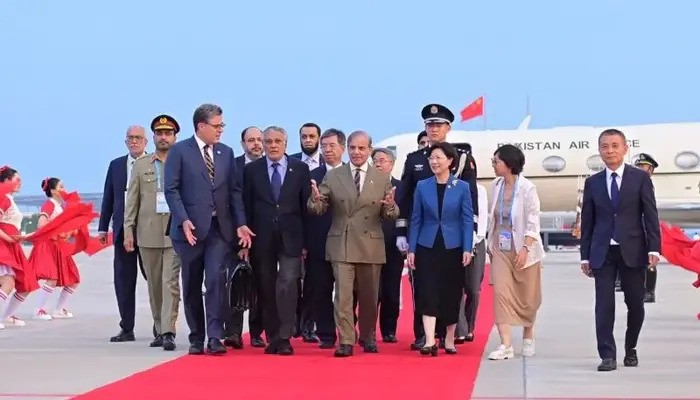Prime Minister Shehbaz Sharif landed in Tianjin on Saturday to attend the Shanghai Cooperation Organisation (SCO summit), while Indian Prime Minister Narendra Modi also touched down in China for the first time in seven years. The high-level gathering has drawn more than 20 world leaders, setting the stage for crucial talks on regional cooperation, security, and economic development.
A historic visit for Pakistan
Shehbaz called his visit “historic” and expressed his eagerness to meet Chinese President Xi Jinping and other leaders. He emphasized Pakistan’s goal to enhance multilateralism, deepen bilateral partnerships, and advance shared peace and prosperity.
Accompanied by Deputy Prime Minister Ishaq Dar and Information Minister Attaullah Tarar, Shehbaz is representing Pakistan at the Council of Heads of State (CHS) summit, which will take place on August 31 and September 1. The summit includes members such as China, Russia, India, Pakistan, Iran, Kazakhstan, Kyrgyzstan, Tajikistan, Uzbekistan, and Belarus.
Pakistan’s priorities at the SCO summit
According to the Foreign Office, Shehbaz will present Pakistan’s stance on pressing regional and global challenges. He will focus on strategies to strengthen the SCO’s role in regional stability, security, and sustainable development.
The premier is expected to reaffirm Pakistan’s commitment to promoting cooperation under the SCO framework while holding bilateral meetings with leaders of member and observer states. His discussions will aim to bolster diplomatic ties and explore new avenues for trade and investment.
Key meetings with Chinese leadership
The Foreign Office confirmed that Shehbaz will meet Chinese President Xi Jinping and Premier Li Qiang during his stay. Talks will revolve around advancing Phase-II of the China-Pakistan Economic Corridor (CPEC), reinforcing economic cooperation, and expanding defense and cultural ties.
He will also attend a military parade in Beijing, marking the 80th anniversary of the World’s Anti-Fascist War, alongside Xi and other world leaders. In addition, Shehbaz is scheduled to engage with Chinese business leaders and address a Pakistan-China B2B Investment Conference.
The visit highlights the deep strategic partnership between Pakistan and China. Both nations are set to prioritize industrial cooperation, agricultural advancements, and modern irrigation technologies under the next phase of CPEC.
Read: Why Is ‘Trump Dead’ Trending Worldwide? What Happened?
CPEC Phase-II launch
The trip also coincides with the official launch of CPEC Phase-II, delayed for nearly five years. This new phase focuses on industrial zones, investment in agriculture, and technological collaboration.
Last month, Pakistan and China formed technical working groups to explore projects such as high-yield cotton seed development, water-saving techniques, and advanced farming methods. These initiatives are expected to give a strong push to Pakistan’s struggling agricultural sector.
Modi’s return to China after seven years
Indian Prime Minister Narendra Modi’s arrival marks his first visit to China since 2018. His participation in the SCO summit comes after years of strained relations, especially following a deadly border clash between India and China in 2020.
Modi arrived in Tianjin after a trip to Japan, where Tokyo pledged to invest $68 billion in India. His presence at the summit signals a cautious thaw in relations, following his meeting with Xi Jinping in Russia last year after a five-year gap.
A gathering of global powers
The SCO summit is set to host leaders from across Asia, the Middle East, and Eurasia. Russian President Vladimir Putin, Iranian President Masoud Pezeshkian, and Turkish President Recep Tayyip Erdogan are among the top attendees.
The bloc, often seen as an alternative to Western alliances like NATO, provides China and Russia with a platform to expand influence in Central Asia and beyond.
UN Secretary-General António Guterres, along with heads of regional and international organizations, will also participate in the summit’s expanded format.
Russia, Iran, and the Ukraine conflict
The Kremlin confirmed that Putin will meet Erdogan during the summit to discuss the Ukraine war. Turkey has hosted several rounds of peace talks between Russia and Ukraine, but none have succeeded in ending the conflict.
Putin is also scheduled to meet the Iranian president to discuss Tehran’s nuclear program. This comes at a sensitive time, as Britain, France, and Germany triggered a “snapback” mechanism to reinstate UN sanctions on Iran over its failure to meet 2015 nuclear deal commitments.
Moscow has warned that renewed sanctions could lead to “irreparable consequences.” Both Russia and Iran have strengthened political, military, and economic ties in recent years, particularly after Moscow’s invasion of Ukraine.
Regional cooperation under SCO
Foreign Minister Ishaq Dar highlighted the importance of the SCO as a vital Eurasian platform. He praised China’s global initiatives, such as the Belt and Road and the Global Development and Security projects, which he said are reshaping economies and fostering integration.
Dar noted that in today’s multipolar world, the SCO has become even more critical for advancing cooperation in security, trade, connectivity, and culture.
Building momentum for multilateralism
With leaders from over 20 nations in attendance, the SCO summit offers Pakistan, India, and other members an opportunity to shape regional dynamics. For Pakistan, the focus remains on strengthening ties with China, accelerating CPEC, and projecting itself as a reliable partner in regional peace and development.
For India, Modi’s return to China after seven years signals a cautious step toward re-engagement in a complex geopolitical environment.
As the summit unfolds in Tianjin, all eyes remain on whether the SCO can deliver tangible outcomes in addressing regional tensions while promoting cooperation across its vast network of members and partners.
Follow us on Instagram, YouTube, Facebook,, X and TikTok for latest updates
